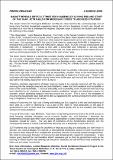March 2005 Basic Needs and Nutrition Basket: Basket Reveals Difficult Times for Households During end and Start of the Year: JCTR Calls for Necessary Steps to Address Situation

View/
Date
2005-03-04Author
Jesuit Centre for Theological Reflection
Type
StatementLanguage
enItem Usage Stats
25
views
views
10
downloads
downloads
Abstract
The Jesuit Centre for Theological Reflection (JCTR) has observed that the unrelenting high cost of living many Zambian households experience during the end and beginning of each year should not be taken as a norm but a challenge that requires pragmatic steps to address the situation and lessen the suffering of the people. “This observation, “ says Muweme Muweme, Coordinator of the Social Conditions Research Project of the JCTR, “is based on the analysis over the years of the Basic Needs Basket information that has shown consistent increases in food and other essential requirements at the end and beginning of each year. For example, in 2004, the cost of food alone in Lusaka was K439,400 in September. It moved to K481,540 in December and K492,940 in January 2005. In 2003, the cost of food alone was K384,450 in September. It moved to K401,800 in December and K409,000 in January 2004. Unfortunately, this situation happens when households are under pressure to meet additional costs
such as school requirements for their children at the start of each year.
Description
Therefore, Zambia’s approach to strategic reserves needs to be carefully examined with the view to ensuring that the strategic reserves are decentralized to make food both available and accessible to most of the rural households. That food availability and accessibility at the household level has long been identified to be a function of adequate income, production, storage and distribution means, for example, evenly spreading strategic reserves around the country. This is one of the strategies of ensuring that households have food all the time as opposed to the current arrangement which seems only to respond to those in urban areas.